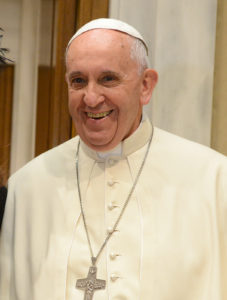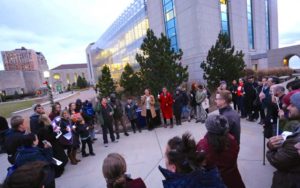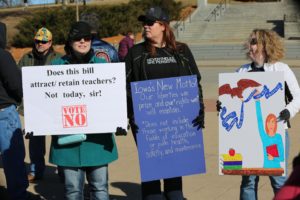Lent Reading
The Working Catholic
by Bill Droel
St. Patrick’s Day fell on a Friday this year. Thus, several Illinois bishops (though not all) and other bishops elsewhere “granted a dispensation” so that the faithful could thereby have corned beef on the feast. (Is there any evidence that workaday Catholics are incapable of making such decisions on their own? I met no such person during my evening out.)
By way of two bishops, here is an alternative to fretting about shamrocks and dispensations. Pope Francis suggests we read On Naboth by St. Ambrose (340-397), bishop of Milan. It is a 32-page commentary on a parable recounted in First Kings 21. St. Ambrose invites us to consider fasting in a more substantial manner than foregoing meat on seven days each spring—only six days if St. Patrick or St. Joseph intercedes.
St. Ambrose does not have to search far in Scripture to conclude that God is not interested in superficial fasting. “The fast that I have chosen,” as St. Ambrose paraphrases God, is to “undo every tie of injustice, loose the bonds of contracts made under duress, set free the broken and break every unjust obligation. Break your bread for the hungry and bring the needy and homeless into your house.”
St. Ambrose continues with a saying that is often reprinted: “Nature, then, knows no distinction when we are born, and it knows none when we die. It creates all alike, and all alike it encloses in the bowels of the tomb.” Go to any cemetery. “Open up the earth and [see] if you are able [to] discern who is rich. Then clear away the rubbish and [see] if you [can] recognize the poor person.”
As for the Old Testament story in First Kings, St. Ambrose cuts no slack for King Ahab, who perhaps had an advance copy of The Art of the Deal. Ahab seems to offer Naboth a deal for his vineyard. I’ll give you either a different vineyard or cash, says Ahab.
St. Ambrose is not fooled. It is arrogance, writes St. Ambrose. Give me, Ahab says. For what purpose? “All this madness, all this uproar, then, was in order to find space for paltry herbs. It is not, therefore, that you [Ahab] desire to possess something useful for yourself so much as it is that you want to exclude others… The rich man cries out that he does not have.”
The First Kings story, St. Ambrose concludes, “is repeated everyday” as we in our dissatisfaction covet other people’s goods.
It is not too late to adopt a Lent discipline. We can try to fast from envy and greed. We can try to be rich in contentment; not only between now and April 16, 2017. But we can practice contentment every day until that day when our last mortal possession is taken to a cemetery to join all the other look-alikes.
It wouldn’t hurt these Lent days and in the coming months to also give something away. Here St. Ambrose has a final piece of advice. “You are commonly in the habit of saying: We ought not to give to someone whom God has cursed by desiring him to be poor.” Or as this is expressed in the United States: We should refrain from helping the undeserving poor. There are no cursed poor, St. Ambrose concludes. There is no divine distinction between the deserving and undeserving. Read the Scripture: “Blessed are the poor, for theirs is the kingdom of heaven.”
Droel edits INITIATIVES (PO Box 291102, Chicago, IL 60629), a printed newsletter.




